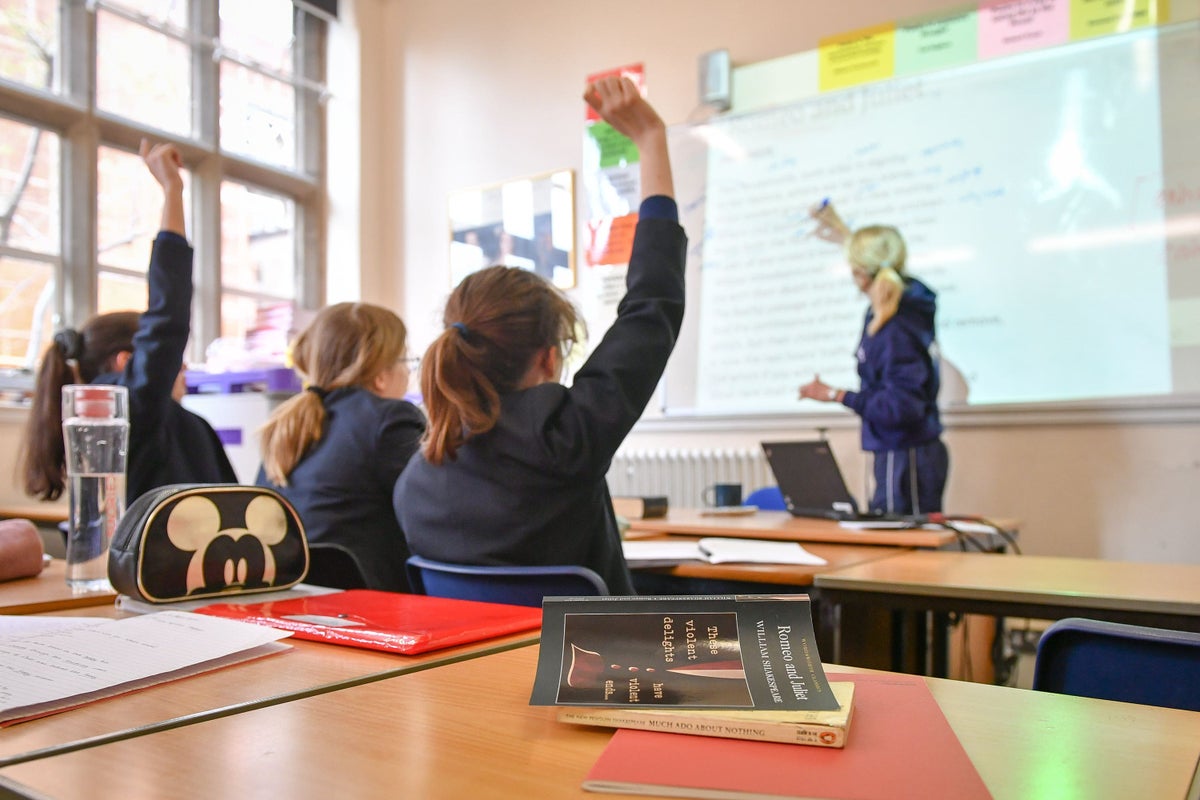
Pupils in England who are absent from school during the exam years are more likely to receive worse GCSEs than their peers, an analysis has suggested.
Only 5% of children who were severely absent in both Years 10 and 11 – and just 36% who were persistently absent – achieved at least five GCSEs, including English and maths, at grades 4 or above in 2022, according to research by the Children’s Commissioner for England.
In comparison, 78% of pupils who were rarely absent in both years achieved at least five GCSEs, including English and maths, at grades 4 to 9 – which is considered a “standard pass”.
Dame Rachel de Souza, Children’s Commissioner for England, has called for urgent action to tackle absenteeism among pupils as she said inactivity risks “failing a generation of children”.
I am deeply concerned by the extent of severe and persistent absenteeism in exam-critical years, which risks undermining young people’s chance of academic success— Dame Rachel de Souza, Children’s Commissioner for England
The analysis brought together the Department for Education’s (DfE) school attendance data for 2020/21 and 2021/22 with the 2022 GCSE results.
It found more than a third of pupils in England were either persistently or severely absent in either Year 10 or Year 11 during 2020/21 and 2021/22.
Overall, 182,398 pupils (32%) in England were persistently absent but never severely absent, and 22,365 pupils (4%) were severely absent.
The school day consists of two sessions – a morning session and an afternoon session. Pupils were classed as “severely” absent if they missed 50% or more of their possible sessions, while pupils who missed 10% or more of their possible sessions, but less than 50%, were classed as “persistently” absent.
The research also highlighted the impact that being very late to school has on attainment.
Unfortunately, a decade of cuts to services has seen both mental health care and the teams that used to support schools with attendance decimated. Schools and parents are often left with nowhere to turn for help— Paul Whiteman, general secretary of the NAHT
It found 31% of pupils who were late to six to 10 sessions across Year 10 and Year 11 achieved at least five GCSEs, including English and maths, at grades 4 or above, compared with 69% of pupils who had no absences due to lateness.
Dame Rachel said: “I am deeply concerned by the extent of severe and persistent absenteeism in exam-critical years, which risks undermining young people’s chance of academic success.
“Whilst the reasons for a child’s absence from school are complex and multi-layered, my report shines a spotlight on the impact of post-pandemic absence on attainment.”
She added: “If we don’t act now, we risk failing a generation of children. There must be a culture of regular attendance in place, with schools properly equipped to tackle persistent and severe absence.
“As I have repeatedly said since I became Commissioner, attendance needs to be everyone’s business, which means GPs, social workers, and all professionals who work with, and for, children being as engaged with attendance as I know teachers are.”
The report called for the Government to introduce a unique identifier for children based on their NHS number which would allow different agencies to share information, identify attendance issues and put in place the right support to ensure that no child falls through the gaps.
It added that every school attendance policy should have to detail how it will build and sustain positive relationships with children with attendance difficulties and their families, and schools should appoint a member of the senior leadership team to manage their attendance policies.
The report concluded: “First, we must set a culture of regular school attendance. Since the pandemic, school absences have become pervasive across the education system.
“The Attendance Audit found that the social contract between schools and families had been damaged following school lockdowns. We urgently need to reset this relationship and rebuild a positive culture around school attendance.”
Paul Whiteman, general secretary of school leaders’ union the NAHT, said: “The link between exam grades and absence shows how important it is that children and young people attend school regularly.
“Everyone agrees that this is the case, but unfortunately not enough is being done to solve persistent absenteeism.”
He added: “Unfortunately, a decade of cuts to services has seen both mental health care and the teams that used to support schools with attendance decimated. Schools and parents are often left with nowhere to turn for help.
We are providing vital support for around 400,000 pupils through our attendance hubs, and our Attendance Action Alliance is supporting delivery of practical support to schools to further raise school attendance— Department for Education
“Large parts of the country do not benefit from either the Government’s attendance hubs, or its pilot mentoring programme for those pupils absent most often.
“This is not an issue schools can tackle alone. The Government needs to redouble its efforts and commit the necessary resources to tackle the issue of severe absence.”
Geoff Barton, general secretary of the Association of School and College Leaders (ASCL), said the report makes clear “the devastating impact of high rates of absenteeism on children’s educational outcomes”.
He added: “Ministers must accept the need to address the underlying causes – rising mental health problems, lack of access to specialist care, very high rates of child poverty and the erosion of local family support services which has taken place over the past decade as a result of government austerity.”
A Department for Education (DfE) spokeswoman said: “Though the vast majority of children are in school and learning, we are taking action to tackle absence in school because we know the damage it can have on a child’s education, well-being and future life chances.
“We are providing vital support for around 400,000 pupils through our attendance hubs, and our Attendance Action Alliance is supporting delivery of practical support to schools to further raise school attendance. We also published new guidance that places an expectation on schools to use data to identify and support at-risk pupils.
“This is on top of our direct work with persistently and severely absent children and their families, where trained mentors are providing tailored support to overcome barriers and support these children back into school.”







